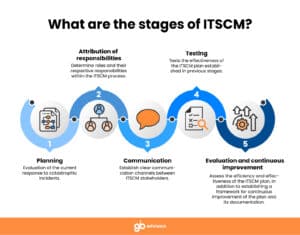The implementation of ITIL and ITSCM has confirmed through its successful results that all the processes that make it up have an unquestionable justification.
Best of all, because they represent no fixed standard, many organizations can take advantage of the opportunity to adapt ITIL cycles to their particular objectives.
Unfortunately, this trend often succeeds in contributing to the downplaying of certain vital ITIL processes. As is the case with the ITSCM.
The IT Service Continuity Management (ITSCM) is an indispensable process in the success of any ITIL project.
Learn about its importance through the following post, and take a further step towards a successful ITIL implementation by putting it into practice.
ITSCM: A Vital ITIL Process
IT Service Continuity Management (ITSCM) represents a part of the ITIL Service Design Lifecycle.
This process compiles policies and procedures to help the organization respond effectively to major incidents and/or system failures.
The idea is that companies can be prepared to manage any possible risks and ensure the service delivery to their customers.

All this, by ensuring that their critical services continue to function even after a significant irregular situation.
ITSCM goes far beyond other ITIL processes such as Incident Management.
Incident management deals with less significant events. Meanwhile, IT Service Continuity Management is more related to incidents have direct impact on Business Continuity.
This classification may vary from company to company, but it always includes those events.
What Are The Advantages of ITSCM?
This process brings many significant advantages for the company. Among them are the following:
- Allows the IT team to minimize the impact of any possible damage that may be suffered by any of the Information Technology components.
- It generates business value since it demonstrates reliability of the service to users.
- Contributes to cutting costs by reducing the import of risk insurance.
- Ensures compliance with regulations.
What are the key factors for the successful implementation of the ITSCM?
Effective Strategies
It is important that IT management teams establish appropriate measures to achieve efficient Continuity Risk Management. For this purpose, there is a set of essential information that the organization must manage, such as:
- Roles and responsibilities of team members.
- Results of the Damage Assessment.
- Process flow and scale diagrams.
- Detailed procedures specifying how to retrieve each component of the IT system.
- Test plans that specify how to prove that each component has been successfully recovered.
- Incident records.
- Fail-back procedures.
- IT test plan.
Support of The Users Involved
When implementing ITIL or any other set of good practices, the cultural change that its implementation represents may cause some members of the organization not to commit themselves sufficiently to achieve the correct ITSCM strategies.
That is why it is vital for you to develop strategies that convince both investors and other users of the relevance that Continuity Management and ITIL processes in general.
The Right Tool
A quality software solution contributes, for example, to:
- Process automation.
- Correctly analysis of the information generated in each activity.
- Determine the level of compliance reached by the organization regarding Continuity Management and ITIL practices.
If what you want a comprehensive, high-tech tool, aligned with ITIL, ServiceNow is the tool for that.
This software solution can allow you to carry out many important processes to achieve good continuity management, such as:
- Incident Management
- Problem Management
- Risk Management
- Metrics Analysis
- Asset Management
It is such a versatile tool that its applications can extend beyond the ITSM department. This makes it not only an innovative tool, but also a highly cost-effective solution.
Why is Continuity Management important?

Even if you take all necessary measures to prevent it, the possibility of a disastrous event that threatens to disrupt your organization’s activities never goes away.
That is why it is essential to have a good Continuity Management strategy that allows your company to respond effectively to any high-impact incident.
To ensure customer satisfaction, your organization must be able to provide an uninterrupted service. This is where the role of ITSCM and ITIL, in general, becomes so re-emphasized.
IT Continuity Management is important, among other things, because:
- Allows controlled recovery of your systems.
- Minimizes downtime, ensuring continuity in service delivery.
- It is essential for a successful ITIL implementation.
So, with this in mind, when adapting ITIL practices to your business needs, try to give the priority it deserves to critical processes such as ITSCM.
Remember that choosing the right tool is a key factor in achieving continuous improvement in your organization.
If you are thinking about securing the business continuity of your organization through an optimized IT service, contact us.



